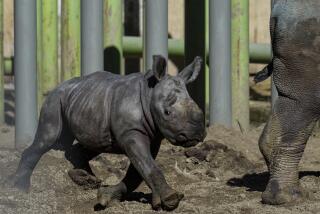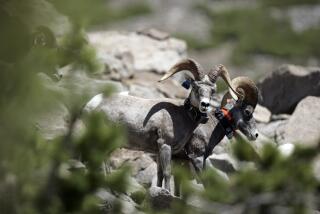Texas hunters auction permit for black rhino hunt, stirring outrage
- Share via
HOUSTON -- Big-game hunters in Texas stirred controversy over the weekend by auctioning off a rare African permit to hunt the endangered black rhino in the name of conservation.
Dallas Safari Club officials have said they faced threats leading up to Saturday’s private auction and had contacted the FBI.
Protesters gathered outside the city’s convention center, where the auction was held during the club’s annual meeting. Opposition to the move was vented online by celebrities including Mia Farrow, William Shatner and former “Price Is Right” host Bob Barker.
Barker released an online letter to the club via the animal rights group People for the Ethical Treatment of Animals that likened hunting an aged rhino to taking out a senior citizen.
“The rhino that your organization reportedly has in its cross hairs is an older ‘non-breeding’ male who has apparently been deemed expendable. As an older male myself, I must say that this seems like a rather harsh way of dealing with senior citizens,” wrote Barker, 90.
“I think that separating the animal to allow new life and old life to continue is a better move. I’m no expert on this; but I feel it’s wrong,” Shatner tweeted.
The southern African nation of Namibia has held six such rhino permit auctions, but Saturday’s was the first held overseas. Organizers said they were approached by Namibian officials in October and hoped to break the previous high bid of $223,000.
According to a statement on the club’s Facebook page, Namibian wildlife officials will accompany the hunter in Mangetti National Park “to ensure the correct type of animal is taken,” and “if the hunt is successful, meat from the animal will feed a nearby community.”
Club officials wrote that all of the auction proceeds “go into a special fund used by the Namibian Ministry of Environment and Tourism for anti-poaching patrols, habitat protection, research and other measures crucial for protecting populations of endangered black rhinos.”
After the auction, club officials announced that the permit, one of several issued annually, had sold for $350,000. They declined to name the winning bidder, but rumors soon began to circulate online.
Speculation zeroed in on the Facebook page of a 35-year-old from Texas who works for a company that organizes big-game hunts and posted the following on Monday:
“Thank you all for your comments about conservation and the current situation regarding the Black Rhino. I am considering all sides and concerns involved in this unique situation. Please don’t rush to judgment with emotionally driven criticism towards individuals on either sides of this issue. I deeply care about all of the inhabitants of this planet and I am looking forward to more educated discussion regarding the ongoing conservation effort for the Black Rhino.”
Conservationists in South Africa wrote back, urging the hunter to shoot the rhino with a dart to subdue and transport it to a sanctuary rather than kill it. Hunters wrote too, urging him to follow through on a big-game dream hunt.
“The antis will never understand so just get the hunt done. They all need to realize that they don’t get to control our life choices because they disagree with it. Stick to what you believe in and don’t change what you love to do,” wrote Gus Brookshier of Ontario, Ore.
Elizabeth Winton of Reading, England, pleaded with the hunter to change his plans, noting that she and her children have been raising money for the organization Save the Rhino.
“I would ask that you reconsider, for the sake of the rhinos and everyone who works tirelessly to help protect these beautiful animals. Gun v animal is no sport. Please do not do this,” she wrote.
Brandon Huntsman of Midvale, Utah, wrote that the man was in a “lose/lose situation.”
“If you kill the rhino then the antis will harass and threaten you no matter how much good it does for the rhino population, if you choose to let it live and cave to the antis then you lose some integrity from a majority of hunters who can be a little more ignorant and aggressive to the antis,” Huntsman wrote. “Only you and your immediate family and closest friends should have any say at all in the matter. I won’t hold any negativity towards you, as any smart educated hunter wouldn’t either in whatever your choice is. Good luck man!
The man did not respond to messages or phone calls. Neither did his employer.
For most of the 20th century the black rhino was the most numerous of all rhino species. It became endangered largely because of poaching and loss of its African habitat due to regional wars. Fewer than 5,000 survived in Africa, fewer than 2,000 in Namibia, down from 70,000 worldwide in the 1960s.
Zoos in Los Angeles and San Diego have rhinos but not black rhinos, with their distinctive hooked upper lip. The San Francisco Zoo’s female black rhino, Elly, billed as the oldest in the country, is also among the most prolific breeders in captivity: She has had 14 calves, many of them relocated to zoos around the U.S. She is joined at the zoo by her 3-year-old grandson Boone, named for San Francisco 49er Alex Boone.
Poachers target the rhinos for their horns, valuable on the international black market, especially in the Middle East and Asia, where the horn powder is believed to, among other things, cure cancer, increase fertility and aid male sexual stamina.
Three years ago, the western black rhino, a subspecies, was declared extinct.
“Biologists in Namibia were hopeful that a U.S.-based auction would produce a record amount for rhino conservation, and that’s exactly what happened. We were honored to be asked to help and we’re pleased with the results,” said Ben Carter, the Dallas Safari Club’s executive director, in the online statement. “I’m proud of our organization for taking a stand to help ensure the future of an iconic species.”
Carter and other club officials did not return calls or emails Monday.
Officials from the International Fund for Animal Welfare say all black rhinos should be protected given their endangered status and that such big-game auctions will only fuel more hunting and poaching.
“Even if it does create short-term money to help, the long-term message is it pays more to hunt than preserve it,” said Jeffrey Flocken, North American regional director for the Massachusetts-based IFAW.
Preserving the rhino for repeated eco-tourism and safaris would benefit Namibians more than auctioning a one-time hunting permit, Flocken said. If the animal being targeted is aggressive (as many black rhinos are), he said, it should be relocated.
The Namibian government has already granted the hunting permit, but in order to return with any part of the rhino, the hunter must receive a permit from the U.S. Department of Fish and Wildlife.
Now, Flocken said, “the big question is what the U.S. government will do.”
The Department of Fish and Wildlife had yet to receive a permit application for the rhino on Monday, according to spokeswoman Danielle Kessler. The applicant could wait until after hunting the rhino to apply, she said, since the permit does not apply to the hunt itself.
“It’s the trophy we’re concerned with,” she said.
Kessler said the standard permit application takes about a month to process but that because the rhino is an endangered species, a public comment period is required, which could delay the process.
“For something like this, it will probably take more extensive contact with the Namibian government, making sure the individual who applied is an eligible hunter,” she said.
The department screens permit applicants to ensure they have no criminal convictions or civil penalties related to wildlife laws, Kessler said.
The club cannot apply on behalf of the auction winner. Once the hunter applies, his name and city will become public record, she said.
Flocken, the conservationist, said opponents of the hunt planned to petition the department and the Obama administration to block the permit. They do not condone threats or violence, he added.
“I don’t want any individual threatened. But we would like the Dallas Safari Club, if they are truly interested in conservation as they’re saying, to look for opportunities that do not involve killing the species,” he said.
ALSO:
Supreme Court turns down Arizona abortion challenge
Embattled Christie faces audit over hurricane recovery funds
Feds to probe why Southwest flight landed at wrong Missouri airport
More to Read
Sign up for Essential California
The most important California stories and recommendations in your inbox every morning.
You may occasionally receive promotional content from the Los Angeles Times.











